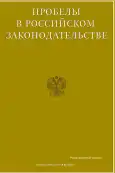On the issue of countering illegal issuance of consumer credits in the Russian Federation
- Authors: Shigalugova M.K.1
-
Affiliations:
- North Caucasus Institute for Advanced Studies (branch) of the Krasnodar University of the Ministry of Internal Affairs of Russia
- Issue: Vol 15, No 4 (2022)
- Pages: 234-237
- Section: Articles
- URL: https://journal-vniispk.ru/2072-3164/article/view/147561
- ID: 147561
Cite item
Abstract
The population of the Russian state has begun to fully take advantage of the achievements of the development of the financial and credit system, which is demonstrated by a very extensive practice of obtaining credits for various purposes. The most common type of credit products at present are consumer credits, which is objectively due to the availability and ease of their execution. However, these characteristics of consumer lending are of interest not only to borrowers, but can also be used as part of illegal activities. Currently, in order to implement criminal intent, individuals who do not have the appropriate authority become active participants in credit legal relations, which ultimately leads to a significant violation of the rights and legitimate interests of borrowers on their part. In 2021, this problem was resolved by introducing Art. 171.5 of the Criminal Code of the Russian Federation, which fixed the responsibility for the implementation of activities for the provision of consumer credits (loans). The purpose of the study is the analysis of topical issues of countering illegal issuance of consumer credits in the Russian Federation. The author comes to the conclusion that Art. 171.5 of the Criminal Code of the Russian Federation has become one of the main elements of the existing mechanisms for countering illegal issuance of consumer credits, which is supposed to be actively used not only in the process of identifying and suppressing criminal behavior, but also the scope of legal consequences enshrined in the sanction of this criminal law norm can be considered as a deterrent factor for those who think about committing such an illegal act. Despite the fact that at present the content of Art. 171.1 of the Criminal Code of the Russian Federation raises many questions, it seems appropriate to wait for a certain practice of its application, which will clearly demonstrate individual weal points and problems.
Full Text
##article.viewOnOriginalSite##About the authors
Maryana Khasanovna Shigalugova
North Caucasus Institute for Advanced Studies (branch) of the Krasnodar University of the Ministry of Internal Affairs of RussiaCand.Sci.(Pedagogics), Police Lieutenant Colonel, Senior lecturer, Department of Law Enforcement Nalchik, Russia
References
- Gladkikh V.I. Illegal banking activity (Article 172 of the Criminal Code of the Russian Federation): theory and practice of application // Banking Law. 2021. No. 5. S. 38-44.
- Gladkikh V.I. Illegal implementation of activities for the provision of consumer loans (loans) (Article 171.5 of the Criminal Code of the Russian Federation): another short story with unclear prospects // Business. Education. Right. 2021. No. 3 (56). pp. 235-238.
- Korkin D.V. An individual entrepreneur as a subject of a crime under article 171.5 of the Criminal Code of the Russian Federation // Actual problems of combating crime: questions of theory and practice: materials of the XXV international scientific and practical conference. In 2 parts. Rep. editor D.V. Kim. Krasnoyarsk, 2022, pp. 150-151.
- Madatova O.V., Pisarenko K.V. Organizational and legal mechanism for ensuring the economic security of Russian citizens from fraud of other individuals in the field of banking and lending // Research Result. Economic research. 2022. V. 8. No. 1. S. 74-84.
- Mursalimov A.T. Digital raiding - a new way of fraud in the field of lending // Bulletin of the East Siberian Institute of the Ministry of Internal Affairs of Russia. 2022. No. 1 (100). pp. 119-127.
- Savchenko M.M. On the nature of fraudulent attacks in the sphere of lending // Bulletin of the Moscow University of the Ministry of Internal Affairs of Russia. 2022. No. 1. S. 261-266.
- Skripchenko N.Yu. Criminal liability for illegal implementation of activities for the provision of consumer credits (loans): analysis of legislative novels // Banking law. 2022. No. 1. S. 72-77.
- Experts named the most indebted regions of Russia in 2022 // IA Krasnaya Vesna. URL: https://rossaprimavera.ru/news/114d9803 (date of access: 05/02/2022).
Supplementary files








